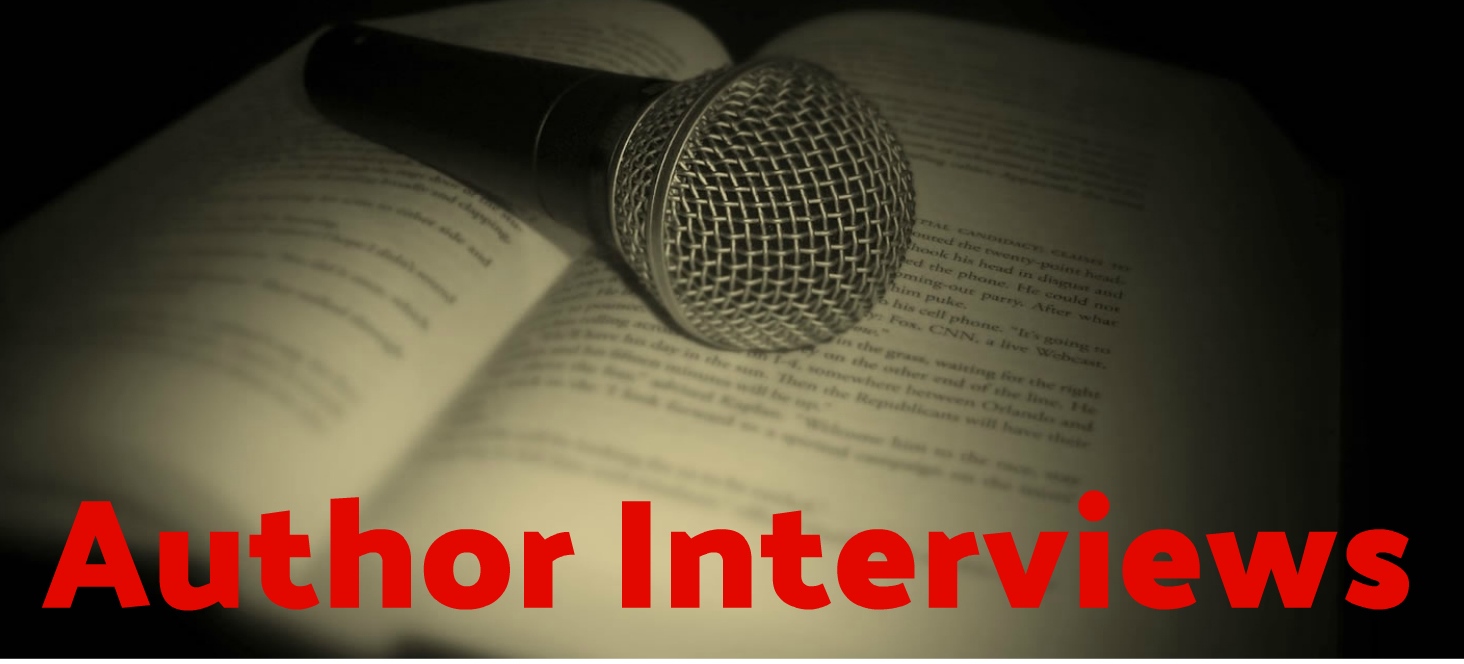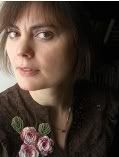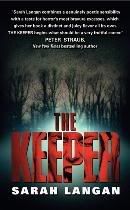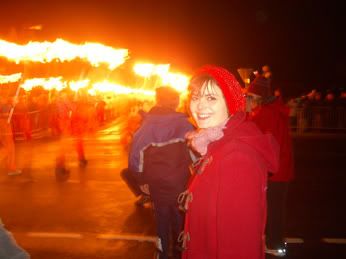
In-Depth Discussions with Today's Darkest Talents
Sarah Langan: Toxicology, Toilet Humor, & Tabasco Sauce
By, Vince A. Liaguno
Sarah Langan has achieved a level of success with her debut novel, The Keeper , that few writers achieve after several books. Hailed by critics both within and outside the genre, Langan’s allegorical tale of corporate greed corrupting and eventually destroying small town America received a Stoker nomination for Best Debut Novel and was singled out by fellow dark scribe Brian Keene as being one of the best books of 2006.
Now, as her highly-anticipated follow-up hits bookstore shelves, Langan is poised to avoid the dreaded sophomore slump with the continuation of Bedford’s story in The Missing .
Dark Scribe Magazine: The Keeper achieved an amazing level of success and critical acclaim for a debut novel. Did that success add to the pressure for the follow-up?
 Sarah Langan: By the time The Keeper came out, I’d finished a draft of The Missing , which I think was lucky. I was writing the book I wanted, instead of responding to readers and critics. Also, my toxicology program kept me pretty busy, so I didn’t have a lot of time for self-doubt. Some people will tell you they can’t wait until they can write full time, but in this case I preferred the distraction. If I had a bad day in front of the computer screen, I could still redeem myself by getting a good grade in carcinogenesis. The two balanced each other very well. Also, since it was school and not a day job, I got to sleep in when I needed.
Sarah Langan: By the time The Keeper came out, I’d finished a draft of The Missing , which I think was lucky. I was writing the book I wanted, instead of responding to readers and critics. Also, my toxicology program kept me pretty busy, so I didn’t have a lot of time for self-doubt. Some people will tell you they can’t wait until they can write full time, but in this case I preferred the distraction. If I had a bad day in front of the computer screen, I could still redeem myself by getting a good grade in carcinogenesis. The two balanced each other very well. Also, since it was school and not a day job, I got to sleep in when I needed.
For my third book, though, I think the time has come to cut the life boat from the ship, and start writing full time.
Anyway, I guess my answer is: I was too busy to notice whether The Keeper was successful. I just kept my head down and worked, a tactic I highly recommend.
Dark Scribe: Tell us a little something about The Missing.
 Sarah Langan: The Missing , or Virus as it’s called in the UK, is about a family on the verge of breaking apart. The main character, Meg Wintrob, is considering leaving her husband, when a lethal virus from the Bedford woods begins to spread through the town. The people who are important (her husband Fenstad, her purple-haired daughter Maddie), suddenly become apparent. Together, they fight to survive.
Sarah Langan: The Missing , or Virus as it’s called in the UK, is about a family on the verge of breaking apart. The main character, Meg Wintrob, is considering leaving her husband, when a lethal virus from the Bedford woods begins to spread through the town. The people who are important (her husband Fenstad, her purple-haired daughter Maddie), suddenly become apparent. Together, they fight to survive.
There is also my usual large cast of characters. Albert Sanguine is the resident homeless lunatic who dropped out of MIT after a schizophrenic break. All novels should have resident homeless lunatics who dropped out of MIT after schizophrenic breaks. James Walker, the son of the hospital CEO, is a bad kid. Serial killer bad. His older brother Danny wants to save him, but he should probably be trying to save himself, instead. Finally, there is Lois Larkin, a sweet-natured knockout with a lisp and less self-esteem that you could fit on the head of a pin. After her boyfriend dumps her, she’s one of the first to be exposed.
The thing about the virus is that it devours its hosts’ humanity, and leaves walking, hungry husks. There’s tragedy in that, I think, for the people suffering from it, and for the survivors who have to witness it. Being separated from a loved one, to me, is one of the worst imaginable horrors.
Dark Scribe: The Missing is being touted as a sequel to The Keeper . Was creating a sequel to The Keeper always the plan – or did the book’s success drive a continuation of the story?
Sarah Langan: I hadn’t planned on writing a sequel, but when HarperCollins acquired The Keeper , it was a stipulation of the contract. I wrestled with that a lot—I didn’t want to go back to the same territory I’d mined in The Keeper , and was worried that in doing so I’d betray the story, and the characters I’d created, whom I still think about, and love.
So I made some changes to The Keeper before it was published, that allowed for a second novel set in Corpus Christi, the affluent suburb near Bedford. I borrowed...stole...from King a little, in that the world view in both The Keeper and The Missing is the same. They’re set in a parallel universe very close to the one we inhabit, only darker. Or, now that I describe it, maybe I stole from Tales From the Darkside. Just as real, but not as brightly lit.
People who read The Missing will see that I left the door open for a continuing series. After I finish my third novel, which is a stand-alone, I might get back to writing the third book in the series. It’s a lot of fun. But then again, writing is a lot of fun.
I was very worried about what my editors would say when they read The Missing , because while some of it takes place in Bedford, you’ll see very few of the same characters. But both my US and UK editors loved it. They’ve been very supportive. So has my agent. I’ve heard...and been the victim of... so many horror stories that I expected the process to be a tug-of-war between HarperCollins’ sales agenda, and the integrity of my writing. It hasn’t happened that way at all. They’re very respectful. Maybe because the books are mass-market paperbacks, they fly under the radar, and I have more freedom, or maybe I just have excellent editors and PR people, who protect me from the bullshit.
I think people expected me to have some kind of a career plan when The Keeper was acquired. I had none. That was probably the most confusing time for me; figuring out what to write next, and how to do it. I was thinking: a second novel in twelve months? Impossible! But it turns out, a year is a good chunk of time if you’re working everyday. I was a little late for my deadline, but I think it was worth it. I can stand behind The Missing, and be proud of it.
My agent has been especially helpful. When thinking about my third book, I met with him, and started throwing ideas at him. Most of them were things I thought he wanted to hear. I guess I aim to please. He told me, “Why don’t you write what you want instead?” So for the third time, I’m lucky enough to be writing a book that I love. So thank you, Joe Veltre. That was pretty awesome of you.
Dark Scribe: Thematically, The Keeper presented the idea of corporate greed acting as vampire in a small town, sucking its lifeblood and taking its innocence. What themes can readers expect in The Missing ?
Sarah Langan: Oh, the same. Except with dancing orangutans. 
Okay, there’s not actually any orangutans, but I like to keep subtext in its place, which is below the surface. I intend certain themes in my work, but who knows whether I actually accomplish them? I’d rather leave it up to other people to interpret what I write.
Having said that, I think The Missing is about the kinds of decisions people make based on fear, particularly when their judgment is clouded by love. Our human folly is that we think we can protect the people closest to us, and in doing so, we are often the ones who commit the harm.
People who say that love is selfless and without jealousy are fibbing. Love is insane. We’d declare war for love. We’d kill for love. We’d die for our children in a heart beat. Love makes us nauseous. It makes us insomniacs. Our need to express and receive it is one of the few human drives that trumps even our survival instincts. Despite our hormones, we don’t cheat. We put other people’s needs ahead of our own. It’s wonderful, and crazy, and destructive, and I wouldn’t want it any other way.
Dark Scribe: Why does horror seem to gravitate to Maine in terms of setting? What is it about this seemingly innocuous state that attracts so many dark scribes?
Sarah Langan: Well, there’s the most excellent Stephen King, for one. I set my first novel there because I went to college there.
Also, I think Maine represents Americana. In the 90s, horror tended to be set in suburbia, not the rural or urban environments of the 60’s and 70’s. Now the pendulum has swung the other way, and Maine is back in vogue.
I have a theory about that. Suburbs were scary when their potential to homogenize was high. We saw the future—long swaths of highway without sidewalks, leading to huge malls and bulk stores where nothing was independently owned, and everything looked a little like a movie set. That stuff isn’t scary anymore because we lost the fight. It happened. Suburbia is shiny, and weird, and every store looks the same, and every house looks like the one next to it, and everybody’s commute keeps getting longer, and the argument that this is progress is sounding more and more like hysteria. How many fifty-roll packs of toilet paper does anybody really need?
So we return to the places in the world that might still have a shadow of mom and pop industries left, because they’ve got flavor. We head for the city, or the country, because there, we’re likely to find room enough for the ridiculous, and the sublime. In our ideal anti-suburb, video store clerks actually know what they’re talking about, and bad, non-chain diners are frequented, not for the food, but for the clientele and the free pints of Schlitz. Maybe they’ve got one of those Christmas stores selling Santa year-round, or some lame Tarot Card and crystal shop run by an absent minded hippie. These places still have the potential for horror because they’re worth something. People love them. Meanwhile, in suburbia, horror turns to the family, and the house under siege, because the community has eroded.
So, that’s my theory. Maine represents an unobtainable perfection. We love that possibility for perfection, and we want to keep it safe, if only in our dreams.
 Dark Scribe: What first drew you to the horror genre?
Dark Scribe: What first drew you to the horror genre?
Sarah Langan: The great thing about horror is its ability to broach subjects that would never fly in literary fiction. George Romero tells great stories, but he also parodies capitalism and consumption, and he takes no prisoners. In a work of literary fiction, you’re not supposed to reference political or social issues that openly. You’re supposed to write about conflicted characters who face a crisis. They get divorced, a loved one is diagnosed with cancer, or maybe it’s something mundane, like their usual coffee guy at 7-11 starts giving them milk instead of half-n-half. Because of this crisis, characters resolve, or chose not to resolve their conflict. That’s the New Yorker formula and it’s what most writing workshops in this country teach their students to follow.
For the most part, it’s a good formula. If you start blathering on about the war in Iraq, the reader gets bored, and they should. It’s insulting to their intelligence to assume that they require a lesson, and that you’re the person to provide it. It also assumes that the author’s point of view is right, and anyone else’s, necessarily, is wrong. I have strong opinions, but I also trust that people who disagree with me are grown-ups, and have good reasons for the things they do. I don’t want to read a novel about how materialistic SUV drivers are, or that torturing prisoners or war is kind of mean. Let me figure out my own position, thank you very much.
That’s where horror comes in. You can have your cake and eat it, too. I can write about real characters dealing with real everyday problems, and overlay them with more topical issues. People tend to assume that horror can’t have meaning, and the authors who practice it do so only because they like gross things. Well, yes. Gross things are cool. But wonderful, exciting fiction is being produced in the genre right now. The new wave writers are smart, and earnest, and funny, and literary, and, dare I say it… important.
Monsters don’t embody politics; they embody fears. Okay, nobody agrees on how to handle global warming or terrorism. But I think we can agree that it’s scary. I think we can agree that it’s an ugly monster that lives under the bed, and in the closet. It knocks on our door late at night. It wants to devour our children, and our children’s children. I think we can agree on that part. And I think everybody feels a little better, even though we can’t agree, when we articulate those fears, and put them into some kind of context.
Dark Scribe: What does dark genre fiction need as a genre to ensure its continued success?
Sarah Langan: It needs quality, which it has right now. I hope writers keep that up, instead of taking the easy way, and publishing for a quick buck now that horror is selling again. Legitimacy is a strange bird. The Road won the Pulitzer, which is wonderful. Suddenly, it’s okay to write about zombies. But wasn’t it always? It’s not the subject , but the execution that matters.
Dark Scribe: There are many schools of thought on the benefits of MFA’s. How integral was your MFA to your writing career?
Sarah Langan: For me the MFA was helpful because I didn’t have the self-confidence to declare myself a writer, get a job in some small town waiting tables, and pen the great American novel. I needed the security of a degree. It also got me noticed. Genre writers aren’t taken very seriously, and the words “Columbia MFA” helped people in the business get over the fact that I write about dead people.
But in general the MFA is sticky. A lot of universities treat their writing programs like cash cows. They don’t have a  coherent approach to teaching, which often results in destructive and petty workshop environments that do more harm than good. What’s worse, they don’t offer enough publishing connections to be worth the money. Columbia was great, and I’d go there in a second if I had to do it all over again. I learned to edit there, and became a much better writer. But anyone considering getting their MFA needs to do their homework. If you’re looking for connection in genre, maybe you should try Clarion or Borderlands Boot Camp first. Join the HWA, RWA, Mystery Writers, or the Thriller Writer’s associations… whatever. Learn what you need to learn, and what connections you need to make before you take the leap. If you’re looking to get published in The New Yorker , or just want to keep your options open, then yeah...go to Iowa or Columbia.
coherent approach to teaching, which often results in destructive and petty workshop environments that do more harm than good. What’s worse, they don’t offer enough publishing connections to be worth the money. Columbia was great, and I’d go there in a second if I had to do it all over again. I learned to edit there, and became a much better writer. But anyone considering getting their MFA needs to do their homework. If you’re looking for connection in genre, maybe you should try Clarion or Borderlands Boot Camp first. Join the HWA, RWA, Mystery Writers, or the Thriller Writer’s associations… whatever. Learn what you need to learn, and what connections you need to make before you take the leap. If you’re looking to get published in The New Yorker , or just want to keep your options open, then yeah...go to Iowa or Columbia.
Dark Scribe: You’re currently pursuing a Masters degree in Environmental Health Science/Toxicology. Can you explain a little about this course of study and what drove you to pursue it? Do fans need to worry that you’ll be abandoning the writing?
Sarah Langan: I’m asthmatic, and to make a long story short, had some serious and pretty terrifying respiratory problems while working downtown post 9-11. I was always interested in science, but that was the real motivation. I wanted to figure out what was happening to me. It turned out to be a great program independent of that, because it informed the virus in The Missing. Also, doing math helps me figure out plot.
The program is mostly toxicology, exposure assessment, mechanisms behind cancer and immune diseases—that kind of thing. It’s fascinating, but a lot of hard work. My thesis is on pediatric asthma in the South Bronx.
Writing is my first love, though, and I plan to always do it.
Dark Scribe: What’s next on the writing slate after The Missing ? Can you give readers a hint or two about the next Sarah Langan novel?
Sarah Langan: I’m pretty excited about my third book. It’s called Audrey’s Door, and it’s set in a haunted apartment building on the Upper West Side. An architect, Rachel Lucas, can’t commit to her live-in boyfriend. She breaks up with him, and moves into an apartment in the building. Once there, her OCD flares up. She hears strange noises from the walls, and at night dreams about an obese woman who tells her, “You ruin everything you touch.” Pretty soon after she unpacks, her OCD compels her to build a door in her living room.
What’s been a nice change is that Audrey’s Door has a single main character, and is more plot-heavy than The Missing and The Keeper . I’m flexing different muscles.
Dark Scribe: You’ve also got some short fiction coming up in Cemetery Dance Magazine and the Shivers V anthology. What can you tell us about "Fenstad’s End" and "The Burn Victim", respectively?
Sarah Langan: "Fenstad’s End" is set in the post-apocalypse on Long Island. Fenstad was a doctor before the world fell apart. When he returns to the hospital where he worked seeking OxyContin, he meets a former patient with whom he shares a shady history. I was trying to imagine my way into The Missing, so I wrote a story from one of its main character’s perspectives. "Fenstad’s End" was the result. In the novel, Fenstad’s character is very different, and a much nicer guy.
I wrote "Burn Victim" years ago. It’s about a couple on a road trip through the desert, who, against all good sense, pick up a hitchhiker outside a maximum security prison in Devil’s Canyon. Bad things ensue.
Dark Scribe: What’s one thing your readers would be surprised to know about Sarah Langan, the person?
Sarah Langan: I like bathroom humor, and often use the word poop . Also, I’m a klutz. Actually, that’s probably not surprising. Surprising? I pour Tabasco Sauce on almost everything I eat. Okay, that’s probably not surprising, either. I think maybe I’m not so surprising.
Editor's Note: Special thanks to JT Petty for providing photos of the lovely Ms. Langan.
For more on the work of Sarah Langan, visit her official author website and MySpace page.



